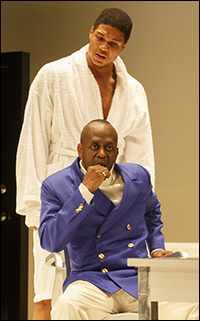
The brief and unlikely friendship between boxer Muhammad Ali and film actor Stepin Fetchit, depicted in Will Power's hit play Fetch Clay, Make Man, doubtless came as a surprise to many of the critics and theatregoers who have seen the drama at New York Theatre Workshop.
That, too, was once the case for playwright Power — who only became aware of the relationship after seeing a photograph of the two men together — and for the actors he invited to play the two historical characters. We asked Power and his two actors, Ray Fisher (Ali) and K. Todd Freeman (Fetchit) what they knew about the men before they set to the task of creating them on stage.
Will Power
What did you know about Ali and Fetchit before first seeing that photograph of them together?
Growing up in the post civil rights/black power era of the 1970s, I was familiar with both Stepin Fetchit and Muhammad Ali, but in what I would describe as limited ways. Ali was everything we as young African-American children wanted to be — he was in essence our superhero. Fetchit was everything we should never be — an "Uncle Tom," a "sellout," a traitor to the race. I had no idea whatever of the complexities that lived both men, never took into account how the environments and the eras that each man came up in influenced, for better or worse, their public personas and individual actions.
What most surprised you about Ali and Fetchit as you did your research into their histories?
For Fetchit, that he was actually an accomplished actor, who was also a journalist, who was also brilliant and shrewd enough to negotiate his own contract in Hollywood. For Ali, that as amazing an powerful and brave as he was, he had a great vulnerability, especially as a young man, that he didn't have all the answers, that he made mistakes, that he wasn't perfect — that he had prejudices, some that didn't get rectified until much later. I was also surprised to discover the story surrounding why Ali would even invite Fetchit to the [boxing] camp — the story of Ali [wanting] to learn the secrets of Jack Johnson, from none other than Stepin Fetchit. This idea, and taking it as truth, was thrilling beyond expression, and of course became the foundation for Fetch Clay, Make Man. What was the key to creating each character on the page?
Understanding the story historically, filling in the gaps, giving the characters strong actions throughout the play that are tested and pushed upon in increasing amounts; and, finally, listening to the rhythms of their voices, watching old footage and acquiring hours of audio recording of both men speaking.
| |
 |
|
| Ray Fisher and K. Todd Freeman | ||
| Photo by Joan Marcus |
What did you know about Muhammad Ali before you took on this role?
Growing up, I knew very little about Ali. I knew he was a boxer and that he was famous for "floating like a butterfly and stinging like a bee," but being a child of the 90's, he was an obscure figure to me. I don't remember discussing him in history class when we learned about the civil rights movement, and when the movie "Ali" was released, biopics weren't really on my radar. I can say I knew of him, but I didn't know the full scope of what he accomplished until I starting prepping for the show.
What did you learn about Ali that most surprised you?
I was really surprised to learn that during the years he was banned from boxing for his refusal to fight in Vietnam, Ali actually starred in a musical on Broadway called Buck White!
What, for you, was the key to playing the part?
The key, for me, was deciphering who Ali was when the cameras were off. Reading and listening to interviews with people that knew Ali best (his family, his ex-wife, his trainers) really helped paint a clear picture of who he was behind all the bragging and bravado.
K. Todd Freeman What did you know about Stepin Fetchit before you took on this role?
All I knew about Stepin Fetchit before I began the play was that he was a stereotypical, negative African-American image/character that originated in old Hollywood films.
What did you learn about Fetchit that most surprised you?
I had not known he was the highest paid black actor of his time — a millionaire. I also didn't know he was a Hollywood bad boy or that he was the first black actor to receive a screen credit. He actually paved the way for his contemporaries in many ways.
What, for you, was the key to playing the part?
After the late 1930's and his final exclusion from Hollywood stardom because of his contentious dealings with studio heads and directors, he spent the rest of his life fighting poverty, and a hostile attitude from other African-Americans who considered his film image degrading and was constantly trying to regain stardom — none of which he ever achieved. He was forever misunderstood until the day he died. That to me is tragic. And that to me is the key to this role: His fight, his hope and desire.
























